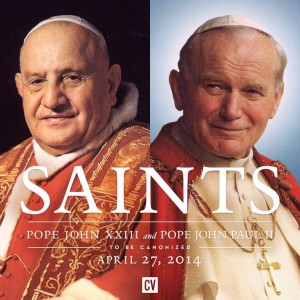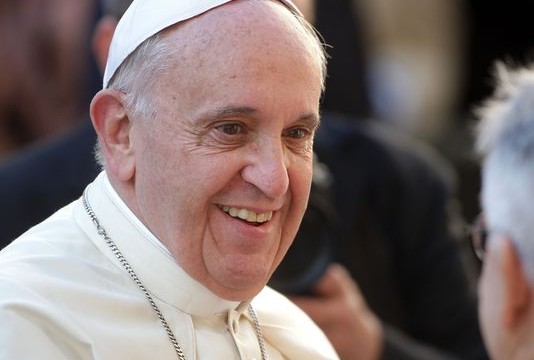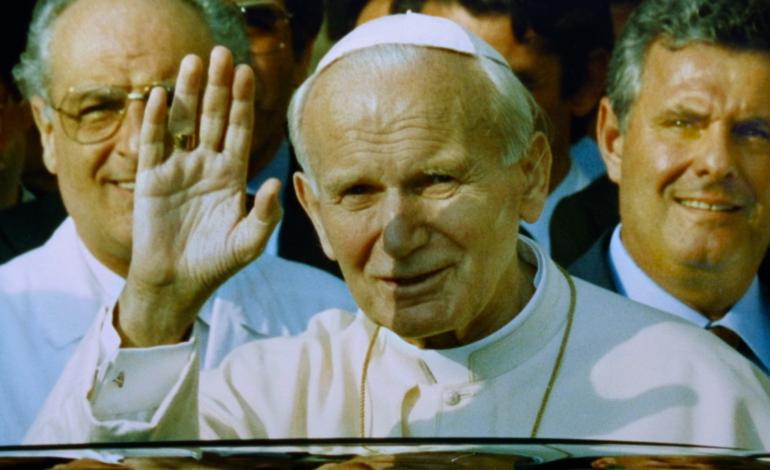Though you and all the rest so grossly led
This juggling witchcraft with revenue cherish,
Yet I alone, alone do me oppose
Against the pope and count his friends my foes.
– Shakespeare, King John
 The media darling Pope Francis killed two birds with one stone on Sunday. Or rather, he canonized two popes in one bash of anachronistic rehash.
The media darling Pope Francis killed two birds with one stone on Sunday. Or rather, he canonized two popes in one bash of anachronistic rehash.
His Jesuitical political aim is to please and appease Catholics and papacy panderers on both the right and the left by bestowing the halo on John XXIII and John Paul II. But Pope Francis is only accelerating the irrelevance of Catholicism, Christianity and organized religion in general.
I can’t quite get my head around the concept of sainthood. It rings so hollow that all I hear is the long, slow bells of the funerals I served as an altar boy nearly 50 years ago.
The Mass was still in Latin in the 5th grade, but ‘the good pope,’ John XXIII, opened up the rites and the religion of Peter (really Paul) with Vatican II, turning ‘Dominus vobiscum’ into ‘The Lord be with you.’ That’s the only Latin I recall except when I get Irish drunk, which I haven’t in many years. Then I could still recite in Latin the bane of all would-be altar boys, the Confiteor.
It wasn’t the priests that provoked my breaking with the religion of my family line on both sides however. It was a nun, Sister Clementia, the terror of St. John’s middle school, indeed of the elementary and high schools at the time as well.
I didn’t have her in the 6th grade, thank God. I sometimes wonder what happened to the poor scarred souls who had their tails whipped after losing the 50/50 coin flip. My fortunate classmates and I had a beautiful nun straight out of the nunnery, with a face, and slim figure under all those layers of woolen robes that half the boys in the class fell in love with.
We never did see a lock of Sister Theresa’s hair slip out beside the blinders the Dominican Sisters wore back then. But she couldn’t hide her pretty, vibrant face, nor her kind and appealing demeanor. We asked ourselves, why did she become a nun?
That was the year John F. Kennedy was assassinated, and I can still recall the somber and steady way she announced his death to the class. Even at that tender age, we sensed that the halcyon world of America before November 22, 1963 had been torn asunder.
The next year I was in junior high in the same ratty old building, long since torn down. One morning I served Mass with a kid I didn’t know, and afterward was walking down the hall with a friend when Sister Clementia came around the corner and charged us. She began beating my friend, who had a reputation as a tough little guy, about he head and face, screaming something about the Mass.
It took me less than a minute, though I remember it as an hour, to realize that she had recognized me and mistook my  friend for the offender who committed the mortal sin of flirting with the girls during Holy Communion. That’s the most hallowed moment of the Mass, when the priest places the consecrated wafer, “the body of Christ,” on the tongues of communicants.
friend for the offender who committed the mortal sin of flirting with the girls during Holy Communion. That’s the most hallowed moment of the Mass, when the priest places the consecrated wafer, “the body of Christ,” on the tongues of communicants.
It wasn’t so much the shocking physical violence, which reduced my friend to a sobbing wreck, that got to me. What really bothered and stuck in my mind and heart was the fact that when I finally got through to this bride of Christ, and she understood that my friend wasn’t the miscreant, she just turned on her heels and walked away, without saying a word.
Being a devout kid, and favorite of the priests (there wasn’t any pedophilia at our parish that I’m aware of), the attack got me thinking. Though it took until I was a junior in high school for me to finish with the Church completely, that was the beginning of the end of my being a Catholic. By the time I was 17, I realized that there was little or no connection between organized religion and genuine religiosity.
So I came down one Sunday when it was still a mortal sin to miss Mass and announced to my staunchly Catholic parents: I’m not going to church today or ever again. So firm was I in this conviction that they could threaten anything (such as my not going to college and thus getting a deferment at the height of the Vietnam War) and it didn’t deter me.
Within months of my declaration, and while sitting in my parent’s backyard and watching nature and the movement of thought/emotion within, as I’d inexplicably had started to do, I had the first and one of the most powerful ‘mystical experiences’ of my life.
I recall watching a robin bounce around on the lush green grass. For weeks I had been asking: What was this observer that always seemed to be separate from what it observed, even in oneself?
Suddenly there was an inward explosion so powerful that it released insights that remain with me to this day. I saw that the observer was an illusion and that separation was illusion. I saw to the roots of man’s alienation, though I had few words or concepts for it as yet.
I felt more than saw that all people were inextricably connected to each other, as well as all life on earth. Beyond words, I experienced union, love and ecstasy. My eyes were opened, and the course of my life was changed for good.
From that day on, I saw the beliefs, rituals and scriptures of religion, including the long tradition of saints in the Catholic Church, for what they are—a fantastic invention of the human mind.
Martin LeFevre

